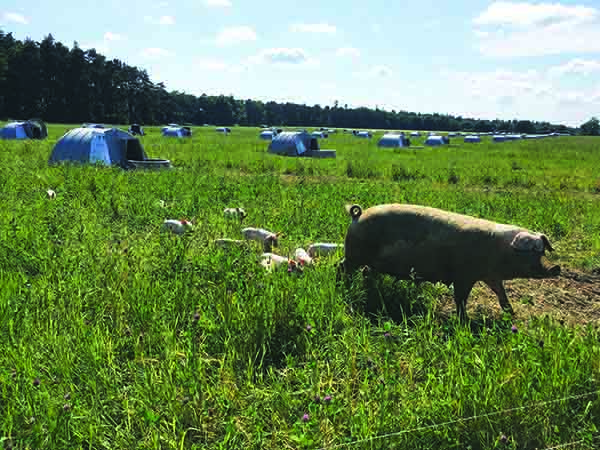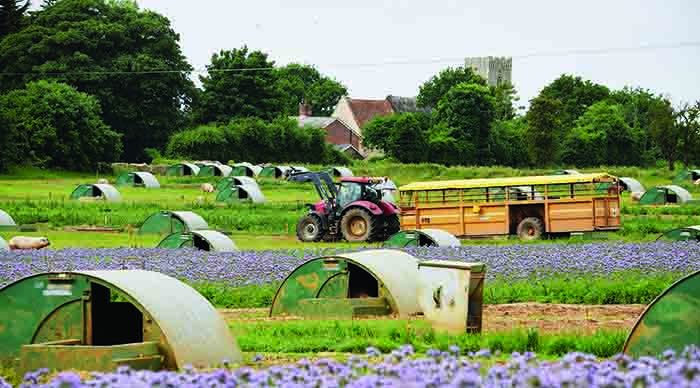Jane Jordan discovers the multiple benefits outdoor pigs can offer for arable farms
Outdoor production might foster a much-valued ‘back to nature’ image, but this romantic notion requires some smart environmental management.
AHDB Pork’s ‘Pigs in Rotation’ workshop, held at Swaffham in Norfolk, produced some interesting perspectives on outdoor production and how this sector – which now accounts for more than 40% of the UK’s national sow herd – is likely to be a key player in Defra’s future farming policy.
Incorporating livestock into an arable rotation gives land a worthwhile break in production – recuperation from continual crop growing, which is known to deplete nutrients and compromise soil health.
When pigs are part of the mix, arable producers have an opportunity to improve soil structure, reduce weed burden and disease carry over, increase retention of valuable nutrients and boost biodiversity – factors that can benefit subsequent crop yields and production economics.
In recent years, landowners have sought to improve the environmental sustainability of crop production. Having pigs as tenants not only offers stable rental revenue, it might also help futureproof arable businesses and enable them to fit in with Defra’s more harmonious and holistic agricultural policy, the meeting heard. It should also open up opportunities for pig businesses by increasing land availability.

Andrew Palmer, AHDB Pork’s knowledge exchange manager east, said contemporary, mixed farming concepts are emerging as landowners explore collaborative ventures with established livestock businesses. Sustainability is driving this trend with clear objectives to improve production value and environmental enrichment for all parties.
It also echoes findings of a recent Defra scoping study highlighting how intensive arable systems can improve environmental outcomes by bringing livestock into the mix.
Until recently, Defra was somewhat naïve about outdoor pig production and the roots it has in arable farming, Mr Palmer said. Officials were also unaware of the professional approach pig farmers take managing ground care, resource protection and biodiversity, he added.
“AHDB Pork, along with key producers and the NPA, have been very active updating Defra and altering government opinions,” Mr Palmer said. “Defra’s now onside with outdoor production and understands how it’s already helping landowners achieve targets that have been put forward in its proposed agricultural strategy. Outdoor pigs have a fundamental role to play.”
FWAG workshops rolled out by AHDB around five years ago helped outdoor herds adhere to the various farm payment/countryside stewardship schemes that landlords were signed up to. These sessions focused on protecting water, preserving soil health, minimising nitrate pollution and preventing erosion. They also encouraged herd managers to become more adept at land management and most outdoor pigmen can now include grassland management and ground care among their pig husbandry skills.
With most outdoor herds on rented arable land, collaboration is already part of the mindset. Producers are well versed in cross-compliance and the constraints land owners must work under to secure areas payments. Environmental management is now on a par with managing the pigs in their care.
BENEFITS OF GREEN COVER
Ed Bramham-Jones, head of farming and water at the Norfolk Rivers Trust (NRT), is involved with a number of catchment-based water protection schemes, including the Water Sensitive Farming (WSF) initiative. Funded by Coca-Cola, the WWF Freshwater Partnership and Tesco, the project helps farmers to develop flexible and targeted soil and water-focused solutions. It also measures outcomes in terms of biodiversity benefits, greenhouse gas emissions and economic benefits to the farm business.
A WSF study with an outdoor herd in Norfolk is assessing how green cover can improve water retention and reduce the effects of diffuse water pollution. Results show that establishing a grass ley on maize stubble for six months, before an outdoor breeding herd is set up, can improve ground water-holding capacity and reduce run-off and erosion from pig production.
Another site is evaluating a two-year, legume-fallow ley to find out whether it offers improved soil structure, greater biodiversity and opportunities for habitat development.
It will also measure the economic viability of grazing ruminants and/or harvesting forage from this nutrient-rich cover crop before pigs are introduced and whether margins and buffer zones can be maintained.
“Establishing and retaining green cover will become more important for pigs in arable rotations because new stewardship schemes will be more focused on retaining ground cover. This has advantages as it ticks a lot of boxes in terms of carbon footprint, water quality and biodiversity,” said Mr Bramham-Jones. Agro-forestry could also benefit arable/pig rotations. Positioned on field edges and boundaries, tree lines could provide shelter belts and shade. Planting fruit trees and fast- growing willow (biomass) offers an alternative income source. NRT is exploring this option and seeking trials sites, with possible grant aid available for a five-year commitment.
PROMOTING WATER QUALITY AND CROP DEVELOPMENT
Fiona Wood, catchment management scientist at Anglian Water, monitors nitrogen levels on a number of contract pig sites.
Her observations suggest that outdoor pig activity does enrich soil nutrients, but also that ground cover influences nitrogen retention and potentially water quality.
Anglian Water’s studies also show that the degree of plant cover on a site influences the amount of nitrogen lost from the soil during winter months. Net loss always increases in the winter due to higher rainfall and leaching is more prevalent.
However, creating and maintaining ground cover on a pig site significantly reduces the net loss of nitrogen and other nutrients, such as potassium and magnesium. “We also think that more organic N is available on the field after pigs, which will benefit subsequent cropping,” said Ms Wood.
This project will now evaluate how arable producers can make the most of the nutrient values gained from pigs.
COVER UP TO BOLSTER GREEN CREDENTIALS
For many outdoor herds agronomy is now an integral part of the management strategy.
Richard Barnes, sales manager with Kings, part of Frontier Agriculture, said pig producers were swiftly realising the value of establishing a good herbage ley before they introduce pigs to a new site and maintaining green cover throughout their two-year occupancy.
“Cover crops offer valuable ecological benefits to arable rotations – even the sceptics are now convinced – and the conversations we are having with pig producers are encouraging,” he said.
For best results, he advises grass leys are sewn at least three months before the pigs arrive.
“A six-month establishment is ideal, but in East Anglia the standard is now to establish a grass ley for a year before a pig unit is set up,” he explained.
Agronomists now offer seed mixtures for pig pastures and can provide pig reports to aid planning and establishment. Forage rye and vetch is a relatively new development, proving a viable alternative to traditional rye grass/ fescue-based swards.
Useful fodder crop can be taken before the pigs move in. Other pig-specific seed mixtures include erosion blends, which are persistent with deep-rooting species such as cocksfoot and Timothy and red clover, which can help to bind soil particles together.
Mr Barnes said pig producers are increasingly aware that learning to manage ground cover and promoting biodiversity can add value to the business.
Nutrient retention, water protection and soil health are important in a rotation, but supply chains are increasingly interested in sustainability, conservation and environmental enrichment.
An increasing number of pig units are now sowing floral pollinator/nectar margins and choosing to create habitat in areas, such as slopes and hollows where water might collect. Surveys show a significant rise in insect, bird and wildlife species on these sites, which is improving the green credentials of the entire farming business.
BENEFITS OF PIGS IN ROTATION
REST AND RECOVERY
Gives land a break from continuous cultivation and agricultural traffic, improving soil fertility and structure.
A two- to three-year herbage ley and pig activity breaks the black-grass cycle. Pigs will root out underground root networks and macerate weeds.
A break in continuous cropping can stop disease carry over.
BIODIVERSITY BENEFITS
Floral/nectar mixes can be cultivated on margins and difficult-to-access areas, qualifying for stewardship support.
Increased insect populations, due to muck heaps, food and ground cover, can bolster bird life.
BALANCING H2O
Pigs can help balance water demands in particular areas.
Unlike thirsty short-term crops, pigs have a consistent water intake all year round.
LONG-TERM RENTAL INCOME
Integrating pigs into a rotation provides opportunity for a long-term tenancy agreement.




